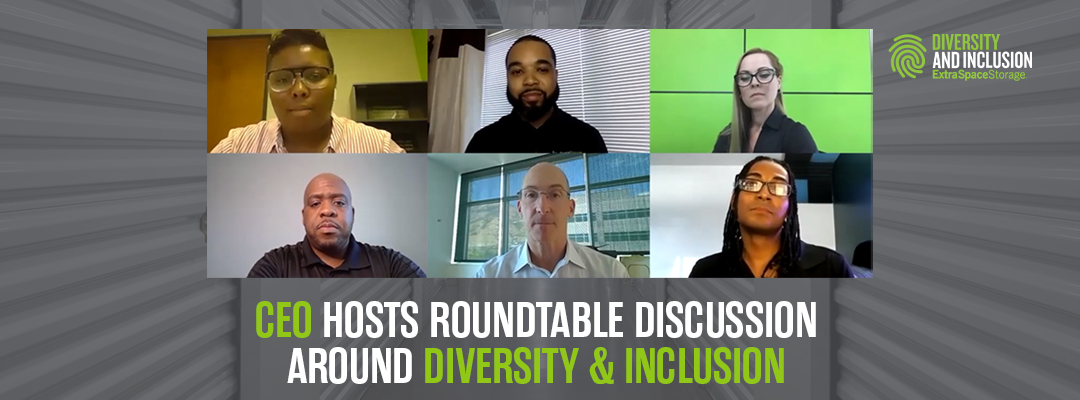At Extra Space Storage, we believe in helping people get to a better tomorrow. For many of us, reaching that better tomorrow includes helping our communities and our workplaces become more inclusive.
We’re dedicated to supporting diversity and inclusion. In 2018, we formed a Diversity & Inclusion Committee to take the lead on company initiatives that would improve inclusion practices and policies, attract and retain top talent, and support our core values. And as racial justice issues have taken the national stage in 2020, the committee—along with CEO Joe Margolis—has been focused on anti-racism efforts.
In August 2020, Extra Space Storage hosted a virtual Diversity & Inclusion Roundtable, during which Margolis spoke with employees about their thoughts and opinions on racial equality, social justice, and how the company can create a more inclusive environment for its diverse team and customers. Participating in the discussion with Margolis were:
- Tyrone Callahan, District Team Lead
- Jay Chemeda, Help Desk Technician
- Tiara Gilkey, District Manager
- Travis Floyd, Senior Division Learning Manager
- Anastasia Krecklow, Store Manager
Below are video clips from the Diversity & Inclusion Roundtable, along with highlights from the discussion.
Q: As coworkers, friends, and community members commit to standing in solidarity against racism, what advice would you share for being a good ally?
Gilkey: Starting the conversation is very important. Be open, honest, and vulnerable, even if it’s uncomfortable. We just need to aim to learn more about each other.
Floyd: In an attempt to be an ally, it’s important for the person who’s asking to support where they can. At work, that might be in the hiring process or the promotion process, or even just celebration of a particular area of diversity.
Chemeda: It takes a lot of effort by everyone to be accountable and just understanding that we all have different levels of emotional tolerance. If boundaries are crossed or blurred, there’s still a possibility to change, and we should be able to celebrate those differences.
Callahan: As an ally, if you see something or hear something in the workplace, it’s our duty as a diverse company with diverse customers to say something. Speak up for what’s right and bring it to the forefront whenever need be.
Krecklow: We all have our differences, and no one deserves to be excluded from society based on their ethnic, social, sexual, or cultural differences. Don’t be silent if you hear something biased. Don’t ignore it. Don’t be a silent witness of discrimination.
Q: In your opinion, what about these most recent tragedies has the world saying “Enough is enough”?
Gilkey: I don’t think it’s necessarily the most recent tragedies. I think now it’s just no longer hidden. Social media has given us a platform to post racial injustice, and it goes worldwide. So now we’re just asking the world, “Is this acceptable?”
Callahan: I think everyone, not just the African-American community, wants some type of accountability. People are saying, “We see what’s going on. Now, someone has to do something about it.” That’s where we are now in society and the world. We want accountability for things going wrong because, if it can happen to one group of people, it can happen to anyone.
Q: What has been your experience parenting children in America, and what advice do you have for raising anti-racist children today?
Callahan: I’m a parent of an 11-year-old son, and we don’t just raise our son. We train our son. We train him how to treat himself and others. We make sure that we expose him to different cultures and things that will intrigue him. Part of the reason we have some of the problems we have now is a lack of understanding, knowledge, and education. Once we educate ourselves and our children on the world around us, I believe we’ll be able to say, “Hey, we’re not so different. We just have a different way of doing things.”
Gilkey: I don’t have children, but my parents raised us to love and treat everybody equally. I would definitely say it’s a learned behavior. It’s opening up your children to being different, and it’s okay to be different.
Chemeda: I don’t personally have kids, but in the IT department, working with computers, you can change the way a computer behaves by changing the programming. Similar with people, throughout life, you learn behaviors that create personalities and temperaments. I think that’s where the conversation needs to start. If we can reprogram how we react to certain situations, I think there’s hope to changing how we live.
Krecklow: My sons arrived in this country with me five years ago, and they also had their own experience of not being accepted based on ethnic origin, based on how they looked and how they talked. Surprisingly, they never shared this with us—the stories of how people walked away from them just by hearing their accent. I suppose my boys thought that it could be taken as a weakness to tell their parents that they felt excluded and mistreated. What I hope for is that, through their own experience of being excluded and mistreated, my sons will never discriminate and never exclude somebody just based on the fact that somebody looks or sounds different.
Q: What can Extra Space Storage do to impact change and support racial equality and social justice?
Chemeda: I’d like to see a minority in leadership.
Gilkey: It’s clear that changes have started to happen, but we can also use more changes. With that, I think it’s important to understand it’s not going to happen overnight, but we definitely have to have the conversation.
Callahan: As a large company and a leader in our industry, Extra Space Storage has a responsibility to stand for what is right when some type of injustice is happening. When social injustice happens, our voice can be louder than a smaller entity, so Extra Space Storage should step forward and look at what’s right.
Floyd: Internally, we could consciously support and encourage diversity through communication and hearing from our leadership. We could even be strategic with our hiring. It’s important that we know upfront that making these changes could be uncomfortable, and we have to be okay with that.
Q: When you think of Black Lives Matter, what’s your take on that?
Margolis: I think the misconception of Black Lives Matter is that it somehow devalues other lives. The best way to represent that was through a cartoon that one of your teammates sent me of someone in a t-shirt that said Save the Rainforest. The other person in the cartoon said, “What do you mean ‘Save the Rainforest’? Don’t all forests need saving?” In response, “No, that’s not the point. The rainforests are burning now.” I think that’s what people miss. Saying Black Lives Matter is not a commentary on white lives or other lives. It’s the fact that the pressure and discrimination is on Black lives right now, and that’s what we need to fix.
Extra Space Storage has launched an internal listening campaign called “Ask – Listen – Act” to create an outlet for employees to share their thoughts and ideas on ways in which we can continue to improve as a diverse and inclusive company. We’re asking questions, we’ll be listening to your answers, and we’ll be taking actions from those ideas.

